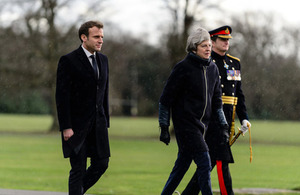In a new treaty signed by Prime Minister May and President Macron last week, the UK has committed to speeding up the process by which refugees in France are able join family in Britain.
 Image credit: UK GovernmentThe full text of the treaty, known as the Sandhurst Treaty, is here.
Image credit: UK GovernmentThe full text of the treaty, known as the Sandhurst Treaty, is here.
According to BBC News, President Macron said the treaty would enable France and the UK to improve the relationship and the management of the joint border and reduce the time taken to process migrants.
The treaty will mean that the time taken to process asylum seekers hoping to come to the UK from Calais will be significantly reduced.
The Home Office said in a fact sheet that France and the UK will aim to transfer children within 15 working days and adults within 30 working days, after the responsibility for examining an asylum claim has been accepted by the other country.
The Refugee Council welcomed the agreement.
Dr Lisa Doyle, Director of Advocacy at the Refugee Council, said: "We warmly welcome the commitment made by the British and French governments to speed up the process by which people desperately wanting to reach their relatives are able to do so. Unaccompanied children and adults have been waiting in limbo and often terrible conditions for far too long, even though they were entitled to join their relatives in the UK."
The Home Office said the treaty further demonstrated the Government's commitment to supporting and caring for asylum-seeking and refugee children.
"In the year ending September 2017, the UK granted asylum or another form of leave to almost 9,000 children and more than 49,000 children since 2010. In 2016 we resettled more refugees under our resettlement schemes than any other EU country," the fact sheet stated.
The Home Office noted, however, that the number of children to be transferred to the UK under the Dubs Amendment had not been changed by the treaty and will remain at 480.
The Independent reported that Downing Street was keen to play down suggestions that Prime Minister May had agreed to accept more refugees, insisting it would simply speed up the process of settling claims.
Further measures in the treaty included the UK agreeing to contribute £44 million to support and improve security measures at the Calais border.
A Government spokesperson told the Guardian: "This is about investing in and enhancing the security of the UK border. Just as we invest in our borders around the rest of the UK, it is only right that we constantly monitor whether there is more we can be doing at the UK border controls in France and Belgium to ensure they are as secure as possible."
President Macron said he hoped the treaty would provide for "the framework in which we shall be able in the coming months to bring about a concrete answer so that we no longer have migrants living in Calais, as we were seeing in the spring of 2016."
Ahead of the signing of the treaty, a group of British and French refugee support groups urged Macron and May to bear in mind the human rights of displaced people currently residing in Calais. In an open letter, the groups noted that since December 2017 alone, three individuals have died a preventable death at the border, including a 15- year old boy who had a legal right to be reunited with family in the UK.
Colin Yeo has some further in-depth analysis of the new treaty on Free Movement here. He notes that as EU law including the Common European Asylum System and Dublin III will cease to apply to the UK in March 2019, some parts of the treaty may prove to be very short lived.